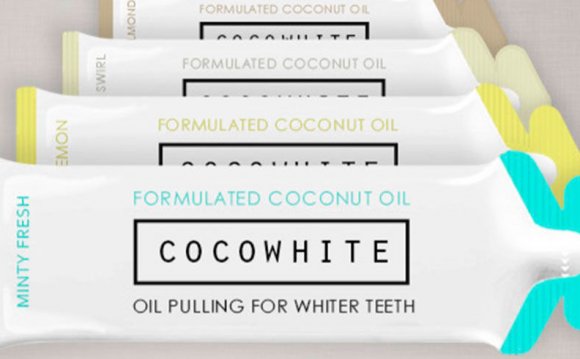
I should begin by saying that few things get my heart racing like the words “natural” and “remedy.” I am the kind of undercover New York new-ager who starts my day with a shot of chlorophyll, uses deodorant (in place of aluminum-containing antiperspirant), and, when things go wrong, will think to myself, “Oh, the eclipse.” So when I heard that everyone from Gwyneth Paltrow to my living-under-the-proverbial-rock-of-med-school best friend was oil-pulling their way to whiter teeth and better skin, suffice it to say my interest was piqued.
For those unfamiliar with the Ayurvedic practice—which has been credited as a potential cure-all for everything from headaches and allergies to hormone imbalances and acne in recent months—it involves swishing a high quality food-grade oil in your mouth (sesame, olive, or coconut, for example) for twenty minutes, then spitting it out. The ancient cleansing method is meant to eliminate bacteria and microorganisms and, along the way, purportedly detoxifying the body’s lymph nodes, glands, and even skin by default.
For all of the hype, many doctors, including Andrew Weil, M.D., the holistic health guru and director of the Arizona Center for Integrative Medicine of the College of Medicine at the University of Arizona, remain skeptical of oil pulling’s broader claims. “Convincing evidence of [its] positive effects on appearance, including acne, or overall health is sorely lacking, ” writes Weil over email. “Any health benefits associated with the practice have yet to be proven definitively.”
The one area where published studies about oil pulling have begun to emerge is in the arena of oral health. Intrigued, but not entirely convinced, I call the New York City Ayurvedic practitioner whose offices are in SoHo.
Like many Ayurvedic practitioners, Raichur credits the ritual with reducing plaque, preventing gingivitis, and even regulating bad breath. That’s because, according to oil pulling’s proponents, plaque is made up of colonized bacteria, which are surrounded by fatty membranes that are attracted to the similarly fatty compounds in, for example, coconut oil—loosening them from the surface of the tooth and lifting them away as you swish, which may also account for the appearance of whiter teeth.
The American Dental Association remains unconvinced. “The studies that have been published on the subject of oil pulling and oral health have some significant shortcomings”—including the lack of a control group to assess whether or not the mere act of swishing breaks up the bacteria through agitation, or if it was caused by the oil—says Edmond Hewlett, D.D.S., a professor of restorative dentistry at UCLA School of Dentistry.
Still, as a drinker of copious amounts of coffee, I had to wonder. With no negative consequences of note, wasn’t it at least worth a harmless tooth-brightening, skin-clarifying test run?
This was how, on a recent Saturday morning, I found myself standing in front of my sink with a teaspoon of solidified organic coconut oil in hand.
Pushing the oil—which quickly dissolves into a thin, tasteless liquid—around my mouth was kind of fun at first, and in an attempt to multitask, I hopped into the shower while I continued to swish. At three minutes, however, I could feel my tongue beginning to exhaust itself.
Eventually, I made it through the twenty minutes—which, after a few more days of practice, became easier to accomplish. (Side note: Here is what I think may be a very real secondary benefit of 20 minutes of swishing every day—stronger facial muscles, i.e., a physical face-lift.) By midweek, my teeth felt a little smoother and my lips were less dry, although my skin remained unchanged.
At work on day four of my oil-pulling experiment, Vogue.com’s beauty director, and culture editor, communally agreed that, in spite of the aforementioned excessive amounts of coffee consumed, my teeth look very white. So white, in fact, that Thessaly mused, “maybe I should start oil pulling . . . ” before sauntering back to her desk. Feeling that much more motivated, I switched out my traditional toothbrush for a Philips Sonicare DiamondClean electric toothbrush the next night.
A full week-and-a-half into my new oral health program—equal parts past and future, nature and technology—I retired the coconut oil altogether in an unprecedented move. Swishing for twenty, it turns out, is pretty labor intensive. And in the words of Hewlett: “Why would you spend 20 minutes oil pulling when you can brush your teeth for two?”
If I’m being perfectly honest, I’d also developed something of a obsession with the Sonicare’s little whirring bristles.









